Prøve GULL - Gratis
Good-Quality Grazing Grass Is Worth Its Weight In Gold
Stockfarm
|October 2020
A livestock producer’s biggest task is to have enough grazing to feed his animals. Good-quality grazing should also be available throughout the year, when and where it suits the producer.

Cultivating pastures can be a breeze if you have water and enough space. And while a solid stand of cultivated grazing will require some capital, it may well yield greater dividends than you expected. However, there are some pitfalls to avoid, especially in the stages prior to planting your grazing.
Choose the right crop
Producers can choose from a myriad summer grazing crops and species, but once you have settled on a type, it is essential that you take the right decisions going forward. While each species has specific traits which determine its cultivation, there are several variables that must be considered. Climate, rainfall, soil type, soil condition, location, altitude and so on determine which species are optimally adapted to a certain area.
This is according to Johan Olivier of Selected Seeds, an expert who works across the country ensuring that producers make the right choices. He says several stalwart grasses are utilised for summer grazing. Perennial species include Eragrostis, Smutsfinger grass, Rhodes grass, white and blue buffalo grass, bottlebrush grass, kikuyu, Bermuda grass and Bahia grass. Annual summer grazing that producers can rely on include teff grass, sweet sorghum, feed sorghum and babala.
Some producers plant only one type, while others prefer planting a variety – usually as a once-off mix – allowing for longer availability of good quality grass.
Do your homework before buying
Johan believes it will be a mistake to use just any mix. Each producer’s farm is unique, and he or she must decide beforehand what the purpose of the cultivated grazing is before compiling a mix. Is it aimed at grazing, haymaking or both? Or will it also be used for silage?
Denne historien er fra October 2020-utgaven av Stockfarm.
Abonner på Magzter GOLD for å få tilgang til tusenvis av kuraterte premiumhistorier og over 9000 magasiner og aviser.
Allerede abonnent? Logg på
FLERE HISTORIER FRA Stockfarm
Stockfarm
Trust and muffins lead the way
In any business, communicating in silos is the main cause of issues among managers. With only three of us managing things, myself on sheep, Gert on vehicles and Mbali on payments, breaking through our silos is easy. Twice a week we hold short morning meetings to report progress and problems towards our goal of turning grass into sheep for profit.
2 mins
December 2025
Stockfarm
Santa's new team
Last December, we warned Santa Claus of the perils of visiting South Africa with his team of reindeer. We cautioned him about the biological hazards his reindeer might bring into the country, and the import tariff issues he might encounter when trying to bring in all those gifts. We also elaborated on the heat and other environmental challenges his team might face. But we also told him about our friendly farmers and the braais he might be invited to, complete with a beverage of his choice.
3 mins
December 2025
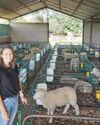
Stockfarm
The effect of iucerne hay quaiiiy on feedlot lambs
Lucerne hay is one of the most widely used roughage sources for ruminant diets, largely due to its reputation for providing high-quality nutrition. Important considerations for producers who use lucerne hay in their feed programme include assessing the true value of lucerne hay, determining the most suitable grade for specific feeding purposes, considering its cost, and balancing these factors against optimal feedlot performance.
3 mins
December 2025
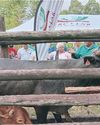
Stockfarm
Imfuyo-yami Ingumcebo Wami: Livestock as a legacy of wealth and wisdom
In the heart of KwaZulu-Natal, under the warm sun and the watchful gaze of the rolling hills, the Hlawini Community Hall in Umfolozi Local Municipality came alive with the spirit of unity, learning, and tradition. The occasion? The Umfolozi Livestock Farmers' Information Day, held under the banner of the Agricultural Research Council's (ARC) Kaonafatso ya Dikgomo (KyD) project, a national an initiative aimed at empowering communal livestock farmers through knowledge, technology, and sustainable practices.
3 mins
December 2025
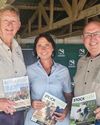
Stockfarm
Celebrating the 2025 Komga Agricultural Show
This year's Komga Agricultural Show, energised by the arrival of summer and filled with festive stalls, was a hive of activity. The grounds came alive with live music, a poultry exhibition, the familiar sounds of cattle and sheep in the pens, displays of horsemanship, and top-quality technology and implements on show.
2 mins
December 2025
Stockfarm
DSA reaches new milestone on the road to excellence
The Dairy Standard Agency (DSA) has enjoyed an exceptional 2025 so far, marking two major achievements that underscore its ongoing pursuit of excellence.
3 mins
December 2025
Stockfarm
Samic: Protector of red meat quality
If you thought the South African Meat Industry Company (Samic) is just about carcass competitions, think again. Fact is, the company plays a pivotal role in South Africa's meat supply chain, upholding rigorous standards of quality, safety, and transparency from the farm gate to the plate.
3 mins
December 2025
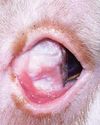
Stockfarm
Wireworm management in small stock
Years of indiscriminate dosing have eliminated weaker wireworms, allowing resistant populations to dominate and spread through flocks. Wireworms typically hatch following good rains and warm nights. When larvae move up the green grass, they are ingested by grazing sheep. About 20 days later, the worms begin sucking blood, leading to anaemia and, in severe cases, death.
2 mins
December 2025

Stockfarm
Back to basics at the 2025 LRF Stockman School
The 17th Annual LRF Stockman School, hosted by the Livestock Registering Federation (LRF), kicked off with great enthusiasm at the Aldam Holiday Resort and Conference Centre in the Free State. Held over three days, the event brought together leading experts from a range of fields who met everyone's expectations by addressing relevant and timely topics head-on.
7 mins
December 2025
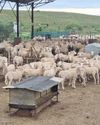
Stockfarm
Vertical gains in the lambing pen: It's not just about the numbers
In a world where rising input costs and increasing consumer demands play a decisive role, it has become more important than ever for red meat producers to raise lambs that not only benefit the producer but also add value throughout the entire supply chain.
4 mins
December 2025
Translate
Change font size

